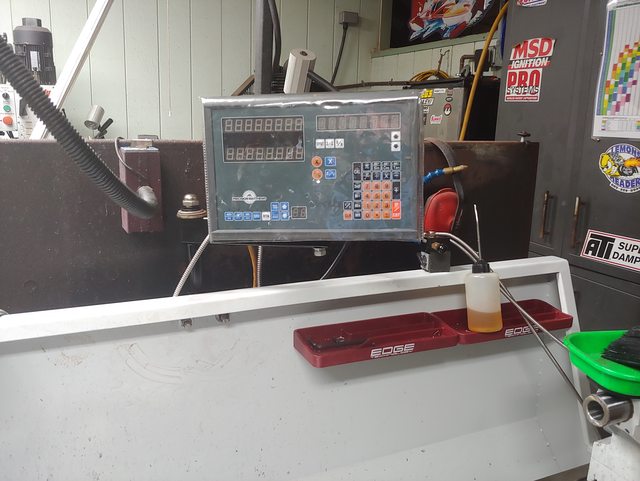Have you tried a free machining grade of aluminum to cut down on the rats nest? I have only used 6061 so far, but have a project that calls out a 2000 series aluminum and I heard it machines so much nicer that 6061, but at about 2-3x the cost.
-
Welcome back Guest! Did you know you can mentor other members here at H-M? If not, please check out our Relaunch of Hobby Machinist Mentoring Program!
You are using an out of date browser. It may not display this or other websites correctly.
You should upgrade or use an alternative browser.
You should upgrade or use an alternative browser.
My 1340GT
- Thread starter Aukai
- Start date
- Joined
- Dec 20, 2012
- Messages
- 9,422
Have you tried a free machining grade of aluminum to cut down on the rats nest? I have only used 6061 so far, but have a project that calls out a 2000 series aluminum and I heard it machines so much nicer that 6061, but at about 2-3x the cost.
2024 does machine really nicely but it will not automatically chip off instead of string unless your cutting conditions are right. If you have enough power and rigidity to take enough depth of cut or feed at a good enough rate then all aluminum alloys will chip instead of string when you're roughing. For the little inserts most hobby guys use, even if you can get the feed rate up high enough to break the chip, the finish suffers due to the smaller nose radii on those little inserts. Everything is a trade off and the key limiting factor is your lathe - how much power, speed and rigidity do you have? If your lathe is on the smaller side, say 12" and under, then you're going to be running at max capacity to have good chip control.
With that said, 2024 does chip easier at a lower feed rate than 6061 but at greater expense. If I recall correctly, 2024 oxidizes easier than 6061 so there is that, too.
- Joined
- Oct 4, 2016
- Messages
- 7,023
The big strings are from the drilling process, on my roughing passes my DOC is .040-.050, and the curls break off in 1-2" springs, which go pretty far. I found a new deflector for that purpose now, a paint stir stick keeps them in the immediate vicinity

I did read that 2024 is not that good for corrosion resistance and is best for parts that would be coated or anodized. The drawings for my project come from Germany and it specs an aluminum that is most similar to 2007, but that doesn’t look like it is available anywhere. The other one that looks similar to the specs is 2011, and from what I have found machines very nicely. But, not having machined either yet, I will defer to your knowledge2024 does machine really nicely but it will not automatically chip off instead of string unless your cutting conditions are right. If you have enough power and rigidity to take enough depth of cut or feed at a good enough rate then all aluminum alloys will chip instead of string when you're roughing. For the little inserts most hobby guys use, even if you can get the feed rate up high enough to break the chip, the finish suffers due to the smaller nose radii on those little inserts. Everything is a trade off and the key limiting factor is your lathe - how much power, speed and rigidity do you have? If your lathe is on the smaller side, say 12" and under, then you're going to be running at max capacity to have good chip control.
With that said, 2024 does chip easier at a lower feed rate than 6061 but at greater expense. If I recall correctly, 2024 oxidizes easier than 6061 so there is that, too.
I have a 12x36 and have been able to get 6061 to chip, but as you say, it takes a pretty hefty cut to do that.
After I wrote my comment, I realized that was probably the case. Cost of materials is a big issue and it hurts putting some of them in the shopping cart lol.The big strings are from the drilling process, on my roughing passes my DOC is .040-.050, and the curls break off in 1-2" springs, which go pretty far. I found a new deflector for that purpose now, a paint stir stick keeps them in the immediate vicinity


 I don't think so, I have enough trouble with analog....
I don't think so, I have enough trouble with analog....